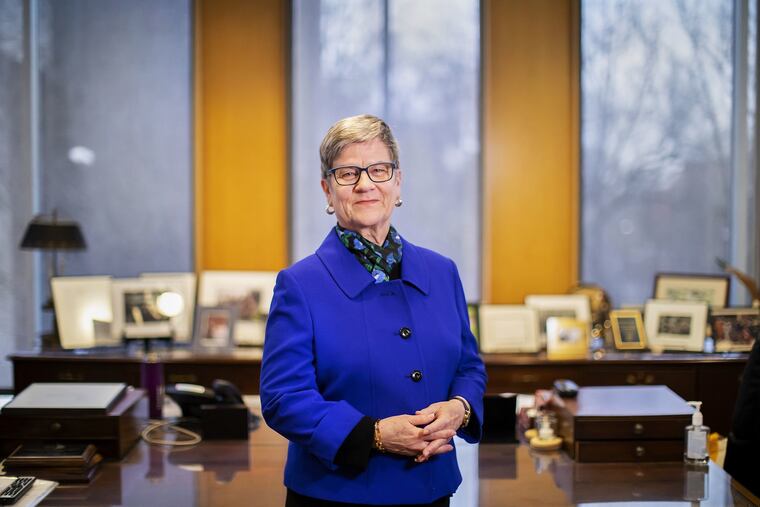Penn’s Kathleen Hall Jamieson wins National Academy of Sciences’ biggest award
“In an age when misinformation, spin, and confusion about whom to trust threatens our very democracy, Kathleen Hall Jamieson’s nonpartisan, evidence-based approach to science communication and political analysis is an invaluable national treasure,” the NAS president said.

The National Academy of Sciences is giving its most prestigious award this year to the University of Pennsylvania’s Kathleen Hall Jamieson for her work as an expert in science communication and as a nonpartisan crusader for the importance of facts in public discourse, the academy announced Monday.
She is the winner of the 2020 Public Welfare Medal, an award previously given to such well-known figures as Alan Alda, Neil deGrasse Tyson, and Bill and Melinda Gates. Last year’s winner was Agnes Matilda Kalibata, who has worked in Africa to drive agricultural transformation.
“In an age when misinformation, spin, and confusion about whom to trust threatens our very democracy, Kathleen Hall Jamieson’s nonpartisan, evidence-based approach to science communication and political analysis is an invaluable national treasure,” academy president Marcia McNutt said in a news release. “Her scholarship has been essential to elevating our public discourse and boosting the integrity of science communication. We are thrilled to present her with our highest honor.”
Jamieson, who is “proudly 73,” is a communication professor at the University of Pennsylvania’s Annenberg School of Communication and director of the Annenberg Public Policy Center, which she founded in 1993. Among the center’s research priorities is a focus on the “science of science communication,” including why there is controversy about climate change and vaccinations despite strong scientific evidence.
Jamieson also co-founded FactCheck.org in 2003 as a way to help voters evaluate political claims. In 2015, the site expanded to include SciCheck, which debunks false or misleading scientific claims.
A prolific author, Jamieson’s most recent book is Cyberwar: How Russian Hackers and Trolls Helped Elect a President.
“For decades, Kathleen Hall Jamieson’s groundbreaking work has shaped political and science communication," Penn’s president, Amy Gutmann, said in a statement. "She has changed how we access and think about facts, what it means to have meaningful discourse, and how this affects all manner of politics, from local elections to presidential campaigns. In today’s political climate, this work couldn’t be more crucial, and we’re proud it’s happening at Penn.”
Jamieson said it was an “understatement” to say she was surprised by the award and believed it was recognition of her pioneering work on how to communicate scientific evidence more effectively.
She became interested in the subject when politics and science collided during the 1988 presidential campaign — that was Vice President George H.W. Bush against Massachusetts Gov. Michael S. Dukakis — around the issue of prison furloughs, or short trips into the outside world to help prisoners prepare for release. The scientific evidence for the value of furloughs was “extraordinarily strong,” she said. But the Bush campaign turned the policy into a major political issue with TV ads featuring Willie Horton, who committed crimes while on furlough from a Massachusetts prison. Jamieson said Democrats also used a crime committed during a furlough to undermine Bush.
She concedes the state of science literacy is still a problem, and says the current cornucopia of news sources of widely varying quality is not helping matters, even though many journalists are doing high-quality, factual work. The more accurate work, she said, no longer has “the same capacity to reach people.”
“One sign that something is badly wrong is that we are having measles outbreaks,” she said, referring to how activists have raised doubts about vaccine safety, though they have no scientific evidence.
It may be possible to “increase the receptivity of the audience,” she said, if scientists explain their sources and how they reached their conclusions, and if people are allowed to explore data and reach their own conclusions. For instance, people have a strong tendency to assume that trends will continue from the most recent end point. Showing them year-to-year variation helps them see variability and broader trends.
She supports teaching high school students how to identify credible information and wants platforms like Facebook to do more to prevent the spread of harmful misinformation. There needs to be more repetition of quality information, such as, for example, links to what the Centers for Disease Control and Prevention says about the Zika virus every time the virus is mentioned.
As for the biggest communication story of the day — the Senate impeachment trial of President Donald Trump — Jamieson is reserving judgment until Republicans have made their case. “I am trying to suspend judgment until we get to the end, because I am chronically optimistic about people standing up to do the right thing when they need to," she said.
Only rare citizens will have watched the whole thing, she said, so she’s interested in how the testimony will be summarized and how factual the summaries will be. The trick will be to help ordinary people understand the proceedings while not losing the forest for the trees. Plus, the American people need to believe the process was fair.
“This is a real test,” Jamieson said, “of the institutional protections the founders put in place.”
Jamieson will receive the award at the academy’s annual meeting in April.